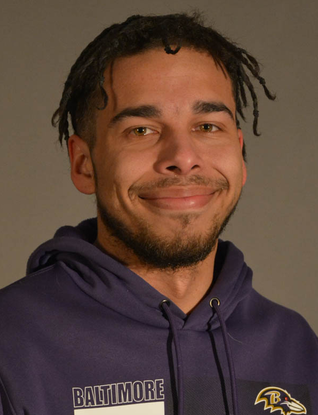Tyler Peil, a graduate student at Winona State, is the epitome of what a true leader looks like. Before Tyler graduated from WSU in 2013, he pursued an Individualized Studies track that allowed him to focus on his passion for Social Justice, Diversity, and Equity.
Now, as a graduate student in Leadership Education Sports Management, he’s spun his passions into action. Tyler has taken on multiple leadership roles, serving as the WSU Student Senate Equity & Inclusive Excellence Chair, along with mentoring students as a Tutoring Services Graduate Assistant & Academic Coach.
This Black History Month, Tyler shares his story of advocacy, mentorship, and his work in fostering inclusive spaces right here in the Winona community.

How do you carry forward the legacy of Black excellence at WSU or in the community?
I contribute to Black excellence by focusing on mentorship, advocacy, and equity. At Winona State, I actively work to address issues of transparency, underrepresentation, and equity — particularly through programs like On Track, which supports students on academic warning by combining tutoring, academic coaching, and courses.
Also, I’m involved in the university’s efforts to create a more diverse and inclusive environment by serving on the Equity and Inclusive Excellence Committee and promoting diverse recruiting initiatives. By advocating for policies that support diverse voices and a more inclusive campus, I am helping create spaces where Black students, as well as other underrepresented groups, can thrive, and feel valued.
Beyond WSU, I mentor young Black men at Winona Senior High School, offering guidance and support as they navigate growing up in a predominantly white community. I aim to be a source of inspiration, and a reminder that they, too, can achieve excellence in all aspects of their lives.
Additionally, my advocacy through lobbying at the state level for universal FAFSA requirements for Minnesota high school seniors is another way I work to ensure that all students have equal access to specific resources they need to pursue higher education.
Doing these things helps me feel hope that there’s a way forward for the legacy of Black excellence and future generations of Black students, both at WSU and in the broader community.
What advice would you share to encourage learning, reflection, and action during Black History Month?
Black History Month is an opportunity to learn, reflect, and act. At a university with less than 3.5% Black representation, it’s crucial to recognize the contributions of the Black community and commit to cultural sensitivity and equity.
Start by learning about Black history, culture, and achievements globally, nationally, and locally. Read, listen to speakers, and engage with events to broaden your understanding. Reflection is equally important–consider how you can challenge inequities and contribute to an inclusive community.
Action is the next step. Support Black-owned businesses, advocate for policies promoting justice, and participate in conversations about race and equity. True change comes from consistent, deliberate efforts that extend beyond February.
What does Black History Month mean to you?
To me, Black History Month is a celebration of the past, a vision for an equitable future, and a call to action. It’s a time to honor Black leaders who shaped our nation and reflect on the injustices Black communities have faced and still face today.
This month reminds us that Black history is American history and must be taught as such. For example, some students’ parents grew up during “separate but equal” times–not that long ago. Recognizing this context deepens our understanding of the systemic barriers still impacting Black communities.
Black History Month inspires me to create inclusive spaces where people of all backgrounds can succeed. It’s a time to celebrate the resilience of those who came before me and strive to ensure future generations face fewer obstacles.
Professionally, it drives my advocacy for systemic change, from supporting FAFSA access to creating opportunities for Black students to thrive. It keeps me focused on breaking barriers and building a more equitable society.